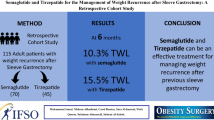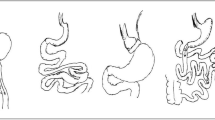Abstract
Purpose
Conditions associated with surgical technique and postoperative lifestyle changes, as well as the characteristics of patients, may affect weight loss following laparoscopic sleeve gastrectomy. In this study, the effects of age, gender, BMI, and excess weight at the time of surgery on weight loss during follow-up were examined.
Materials and Methods
Demographic data (age, gender), preoperative BMI, and weight values of the patients were recorded. TWL% and EWL% values of patients were recorded during follow-up at 1st, 3rd, 6th, 9th, 12th, and 18th months. Patients were grouped according to age (AGE1 < 30, AGE2 30–50, AGE3 ≥ 50 years), BMI at the time of surgery (BMI1 ≤ 50, BMI2 > 50 kg/m2), and EW at the time of surgery (EW1 ≤ 60, EW2 > 60 kg). EWL% values obtained in the follow-up visits were compared among the gender, age, BMI, and EW groups.
Results
A total of 456 patients (371 females, 85 males) were operated. Mean EWL% was lower in AGE3 group (p < 0.001). Patients in AGE1 group had the highest mean EWL%, while those in BMI2 and EW2 groups had lower mean EWL% values throughout the follow-up period (p < 0.001). Regression analysis showed that age and BMI were associated with EWL% at all follow-up visits (p < 0.05).
Conclusion
Patients with less than 60 kg of excess weight, those with BMI ≤ 50 kg/m2 and younger patients may lose weight more effectively following LSG.




Similar content being viewed by others
References
Picot J, Jones J, Colquitt JL, et al. The clinical effectiveness and cost-effectiveness of bariatric (weight loss) surgery for obesity: a systematic review and economic evaluation. Health Technol Assess. 2009;13(41):1–190. 215–357
Colquitt JL, Pickett K, Loveman E, et al. Surgery for weight loss in adults. Cochrane Database Syst Rev. 2014;8:CD003641.
Angrisani L, Santonicola A, Iovino P, et al. Bariatric surgery worldwide 2013. Obes Surg. 2015;25:1822–32. https://doi.org/10.1007/s11695-015-1657-z.
Wang K, Jiang Q, Zhi Y, et al. Contrasting sleeve gastrectomy with lifestyle modification therapy in the treatment of polycystic ovary syndrome. J Laparoendosc Adv Surg Tech A. 2015;25(6):493–8. https://doi.org/10.1089/lap.2014.0511. Epub 2015 May 8
Capristo E, Panunzi S, De Gaetano A, et al. Intensive lifestyle modifications with or without liraglutide 3mg vs. sleeve gastrectomy: a three-arm non-randomised, controlled, pilot study. Diabetes Metab. 2018;44(3):235–42. https://doi.org/10.1016/j.diabet.2017.12.007.
Wang Y, Yi X, Gong L, et al. The effectiveness and safety of laparoscopic sleeve gastrectomy with different sizes of bougie calibration: a systematic review and meta-analysis. Int J Surg. 2018;49:32–8.
Yuval JB, Mintz Y, Cohen MJ, et al. The effects of bougie caliber on leaks and excess weight loss following laparoscopic sleeve gastrectomy. Is there an ideal Bougie size? Obes Surg. 2013;23(10):1685–91. https://doi.org/10.1007/s11695-013-1047-3.
Rosenthal RJ, International Sleeve Gastrectomy Expert Panel, Diaz AA, et al. International sleeve gastrectomy expert panel consensus statement: best practice guidelines based on experience of >12,000 cases. Surg Obes Relat Dis. 2012;8(1):8–19. https://doi.org/10.1016/j.soard.2011.10.019. Epub 2011 Nov 10
Abdallah E, El Nakeeb A, Yousef T, et al. Impact of extent of antral resection on surgical outcomes of sleeve gastrectomy for morbid obesity (a prospective randomized study). Obes Surg. 2014;24:1587–94.
Parikh M, Gagner M, Heacock L, et al. Laparoscopic sleeve gastrectomy: does bougie size affect mean %EWL? Short-term outcomes. Surg Obes Relat Dis. 2008;4(4):528–33.
Wang Y, Yi X, Li Q, et al. The effectiveness and safety of sleeve gastrectomy in the obese elderly patients: a systematic review and meta-analysis. Obes Surg. 2016;26(12):3023–30.
Giordano S, Victorzon M. Bariatric surgery in elderly patients: a systematic review. Clin Interv Aging. 2015;10:1627–35.
Burchett MA, McKenna DT, Selzer DJ, et al. Laparoscopic sleeve gastrectomy is safe and effective in elderly patients: a comparative analysis. Obes Surg. 2015;25(12):222–8.
Peterli R, Wölnerhanssen BK, Peters T, et al. Effect of laparoscopic sleeve gastrectomy vs laparoscopic Roux-en-Y gastric bypass on weight loss in patients with morbid obesity: the SM-BOSS randomized clinical trial. JAMA. 2018;319(3):255–65. https://doi.org/10.1001/jama.2017.20897.
Leivonen MK, Juuti A, Jaser N, et al. Laparoscopic sleeve gastrectomy in patients over 59 years: early recovery and 12-month follow-up. Obes Surg. 2011;21:1180–7. https://doi.org/10.1007/s11695-011-0454-6.
Sabench Pereferrer F, Molina López A, Vives Espelta M, et al. Weight loss analysis according to different formulas after sleeve gastrectomy with or without antral preservation: a randomised study. Obes Surg. 2017;27(5):1254–60. https://doi.org/10.1007/s11695-016-2454-z.
Osland E, Yunus RM, Khan S, et al. Weight loss outcomes in laparoscopic vertical sleeve gastrectomy (LVSG) versus laparoscopic Roux-en-Y gastric bypass (LRYGB) procedures: a meta-analysis and systematic review of randomized controlled trials. Surg Laparosc Endosc Percutan Tech. 2017;27(1):8–18. https://doi.org/10.1097/SLE.0000000000000374.
Perrone F, Bianciardi E, Benavoli D, et al. Gender influence on long-term weight loss and comorbidities after laparoscopic sleeve gastrectomy and Roux-en-Y gastric bypass: a prospective study with a 5-year follow-up. Obes Surg. 2016; https://doi.org/10.1007/s11695-015-1746-z.
Ockell J, Elander A, Staalesen T, et al. Evaluation of excess skin in Swedish adults 18-59 years of age. J Plast Surg Hand Surg. 2017;51(2):99–104. https://doi.org/10.1080/2000656X.2016.1187157. Epub 2016 Jun 10
Kakoulidis TP, Karringer A, Gloaguen T, et al. Initial results with sleeve gastrectomy for patients with class I obesity (BMI 30-35 kg/m2). Surg Obes Relat Dis. 2009;5(4):425–8. https://doi.org/10.1016/j.soard.2008.09.009. Epub 2008 Sep 26
Puzziferri N, Roshek TB, Mayo HG, et al. Long-term follow-up after bariatric surgery: a systematic review. JAMA. 2014;312(9):934–42. https://doi.org/10.1001/jama.2014.10706.
Lauti M, Kularatna M, Hill AG, et al. Weight regain following sleeve gastrectomy-a systematic review. Obes Surg. 2016;26(6):1326–34. https://doi.org/10.1007/s11695-016-2152-x.
Braghetto I, Csendes A, Lanzarini E, et al. Is laparoscopic sleeve gastrectomy an acceptable primary bariatric procedure in obese patients? Early and 5-year postoperative results. Surg Laparosc Endosc Percutan Tech. 2012;22(6):479–86. https://doi.org/10.1097/SLE.0b013e318262dc29.
Acknowledgments
The authors gratefully acknowledge Dr. Sırma Tilev for assistance in the editing of the manuscript.
Author information
Authors and Affiliations
Corresponding author
Ethics declarations
Conflict of Interest
The authors declare that they have no conflict of interest.
Ethical Approval
Ethics committee approval was obtained for this study.
Informed Consent
Informed consent was obtained from the patients.
Additional information
Publisher’s Note
Springer Nature remains neutral with regard to jurisdictional claims in published maps and institutional affiliations.
Rights and permissions
About this article
Cite this article
Sisik, A., Basak, F. Presurgical Predictive Factors of Excess Weight Loss After Laparoscopic Sleeve Gastrectomy. OBES SURG 30, 2905–2912 (2020). https://doi.org/10.1007/s11695-020-04624-y
Published:
Issue Date:
DOI: https://doi.org/10.1007/s11695-020-04624-y




